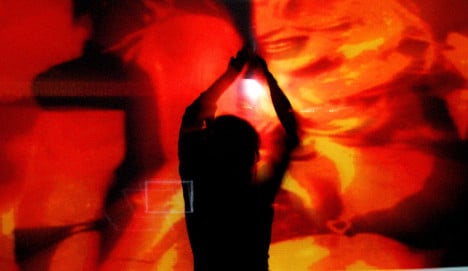Berlin in the summertime is like nowhere else. It’s a time when the personality of this European Neverland shines with the weird and wonderful, where you can feel like it’s a day at the beach although the sky is pitch black and you're hours from the sea.
The Local picked out some of our favourite places with outdoor spaces to relax in the fresh air in between dancing the warm nights away.
1. Sisyphos
Sisyphos (alte Hundekuchenfabrik) in Berlin pic.twitter.com/yzra253dWz
— SkyParkSecure (@skyparksecure) March 5, 2016
If there’s another Berlin club that rivals Berghain in terms of infamy, it is Sisyphos.
But it doesn’t have the same straight-faced door policy as its Friedrichshain rival: a blue-haired young bouncer, dressed like a carny, might flash you a sly smile if you look like you're taking yourself too seriously.
As with many of Berlin’s best and illusive nigh spots, this far-flung club in Berlin-Rummelsberg has a no pictures policy and they’ll offer a sticker to put over your phone camera upon entry.
SEE ALSO: The website that will 'train' you to get into Berghain
If photos were allowed though, they’d capture all the zaniness inside what Sisyphos itself calls “Berlin’s carnival for day and night” with shirtless club-goers in black bunny masks, furry fox hats and a decent helping of glitter on their faces.
The venue on the premises of a former dog treat factory feels like a small, surreal village with two indoor dance floors, a large outdoor perimeter to chill on benches or a broken-down truck, and food stands where you can grab a slice of pizza (or free banana?) when you need it.
2. Yaam
#YAAM #berlin pic.twitter.com/rvdAreC2LP
— Barbara Collevecchio (@colvieux) July 21, 2015
For those not so excited by Berlin’s techno scene and too-hip-for-you dance spots, there are other options, like Yaam by Ostbahnhof.
This club and beach bar offers a great mix of live reggae, hip-hop and dance hall performances as well as West African and Caribbean food and drink – refreshing mango beer on a warm summer night anyone? Enjoy it with sand between your toes in the outdoor area along the Spree, complete with volleyball net.
3. Prince Charles
Little Louie Vega rocks Prince Charles Club in Berlin/// pic.twitter.com/gKrBbEJasp
— Podgasim (official) (@podgasim) May 9, 2015
Just part of this club is outdoor, but after jumping around to hip-hop music in the basement or ground-floor level dance halls, you’ll need a trip outside to sit and cool down.
Plus, when the weather’s right, this place is home to outdoor events like Burgers and Hip-Hop, European Championship viewings with barbecue and African soul food nights.
4. Watergate
There’s something magical about stepping out onto Watergate’s patio on the Spree after bouncing around to techno music and catching the first rays of sun rising over the Oberbaumbrücke, glimmering on the river below you.
5. Griessmühle
This Neukölln venue located along a canal of the Spree is classic Berlin grunge, its outdoor area offering a hodge-podge of second-hand sofas and seating as well as an outdoor bar, abandoned car and treehouse-like structures to climb into.
It’s also home to English comedy shows on occasion, open-air film screenings and flea and food markets that then turn into club nights.
6. Klunkerkranich
 Photo: Emma Anderson/The Local.
Photo: Emma Anderson/The Local.
Okay so this one isn't as much of a club as the others, but its small indoor area does offer plenty of DJs and dancing on the weekend and unexpected performances by mimes juggling flaming hula-hoops are not uncommon.
Plus its rooftop location and amazing view over the city above the Neukölln Arcaden make it hard for us not to mention.
7. Strandbar Mitte swing nights
 Photo: DPA.
Photo: DPA.
And if you're looking for something still further removed from the whole techno club scene, Strandbar Mitte by Monbijou park offers Friday night outdoor swing dancing lessons while overlooking the capital's scenic Museum Island.
But there's also tango, salsa and chacha nights at this beach bar. Beginners of all ages are welcome.



 Please whitelist us to continue reading.
Please whitelist us to continue reading.
Member comments